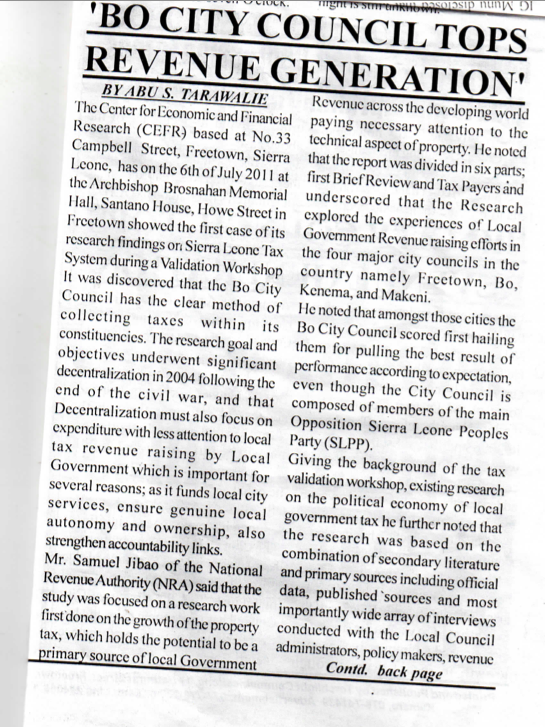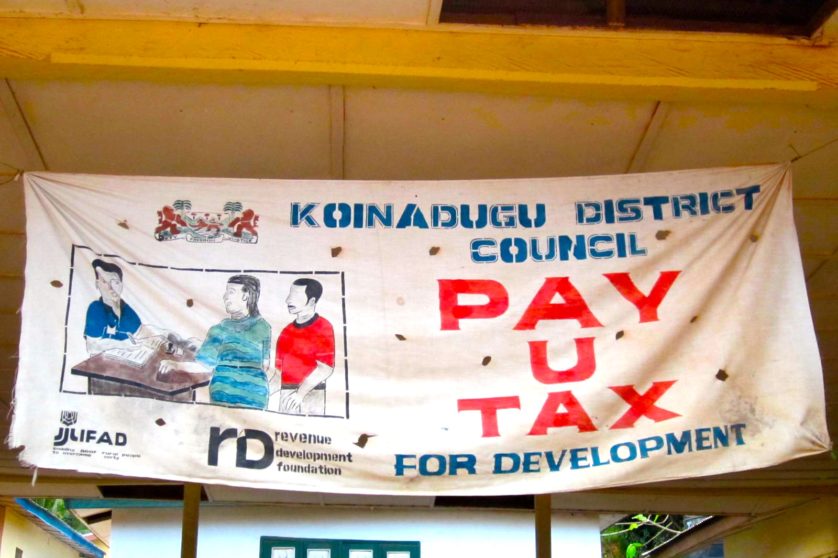In most of Africa, local government is in poor condition. Local governments provide few reliable services. The people that they fail to serve generally have a low opinion of them. One important reason is that local governments have little money. An important reason is the weakness of local revenue, which starves governments of funds and weakens the social contract between governments and local citizens.
We know in principle how to design effective local revenue systems. We know that in practice political factors block change. There have been many reform and aid initiatives. They have often focused on trying to develop one of the most obvious and desirable sources of local ‘own revenues’ – property taxes. But there has been little cumulative progress.
One of ICTD’s long term aim is to change this situation: to find out what local revenue reforms work in some places, and find ways of making these ‘snowball’. To do this, we have to keep a very close eye on the politics.
We began our work in Sierra Leone, conducting detailed research on the politics of property tax reform in 2010-12. The local research group was led by Dr Samuel Jibao, formerly Research Director at the Sierra Leone Revenue Authority. The research focused on two simple questions: First, how can we explain the relative success of a locally driven property tax reform initiative in Sierra Leone’s largest City Councils? Second, how can we also explain why that reform was more successful in some City Councils than others?
A banner in Koinadugu District Council – Sierra Leone
At a broad level we presented detailed evidence that success reflected a well designed and locally appropriate reform program. But, ultimately, variations in success among cities depended overwhelmingly on levels of local political support. Reform was most successful where: (1) Political leaders were less connected to, and reliant on, economic elites resistant to reform, (2) There was greater ethnic diversity among elites, which helped to fragment resistance, (3) Local councils were aligned with the national political opposition – this meant they could not expect much financial support from the central government, and so have incentives to develop their own tax base, and (4) where local democracy worked well, and political parties made proactive efforts to build popular support for taxation and related services.
Armed with these research results, we were able (a) to share the conclusions directly with policy makers, who have subsequently supported the expansion of successful policy initiatives, (b) to engage actively with donors, in a parallel effort to encourage the adoption of effective reform strategies, in Sierra Leone and elsewhere, and (c) to draw media and popular attention to the issue, thus contributing to local pressure for reform.
Our four key policy messages are:
• First, simplicity in design– including simplified property valuation and IT systems – allows for the development of sustainable local capacity to implement reform programs.
• Second, the key to reform lies not in extensive funding, but in long- term and hands on local technical support. This type of support is needed to help develop sustainable local capacity and to help deal with the inevitable local political resistance.
• Third, reform programs should focus less on revenue raising itself as an indicator of success, and more on transparency, links between revenue and expenditure, and ensuring that local elites are seen to pay their share of the tax burden. These factors are essential to technical success, but are also useful indicators of local political commitment to reform.
• Fourth, funders of reform, whether governments or donors, should be more selective in targeting support for reform, acting more strategically to identify local reform leadership and support it.
An excerpt from a Sierra Leonean newspaper

Sierra Leone, the research has been communicated through close relationships with the Local Government Finance Department, through organising events for local government officials, and through media coverage. A validation workshop, attended by leaders from most Councils in the country: exposed policy makers to key findings and messages; put pressure on weak performers to improve; and attracted media coverage, thus generate more political pressure for reform.
Meanwhile, internationally the research became a springboard for communicating new lessons about property tax reform to donors. The ICTD researchers were twice invited to present the work to World Bank, including World Bank staff – and government partners – involved directly in the Sierra Leone decentralization reforms. Our work was featured in internal discussions, and was reported to have influenced internal thinking about approaches to reform in Sierra Leone and elsewhere.
Soon after, one of our researchers, Professor Wilson Prichard, was invited to help with the design of a property tax reform funded by the Canadian government in Ghana. That project is ongoing. It has influenced parallel projects in Ghana supported by USAID and GIZ. Most recently, the work in Sierra Leone became the foundation for an ICTD workshop on Property Tax Reform in Africa held in Addis Ababa in February 2016. This included leading voices from around Africa, and internationally. This work is poised, in turn, to feed into further outreach and innovative new projects.
